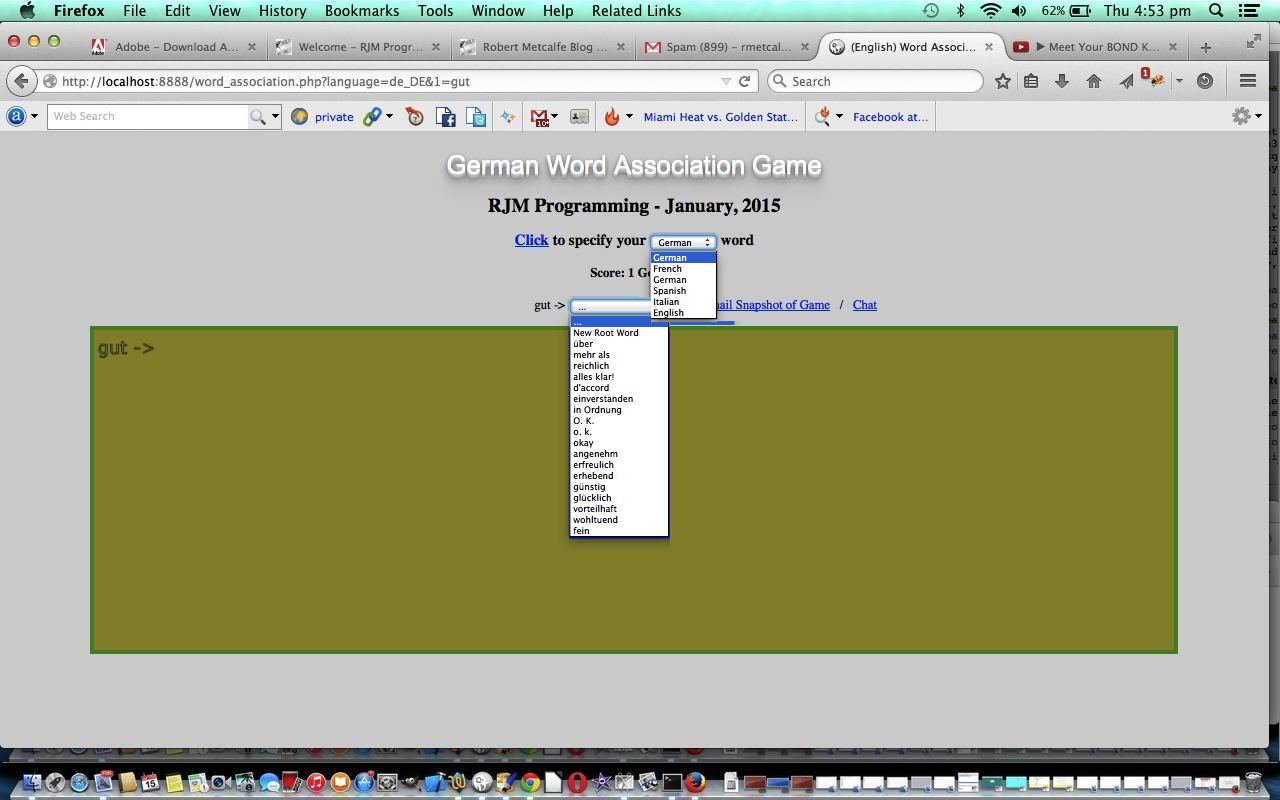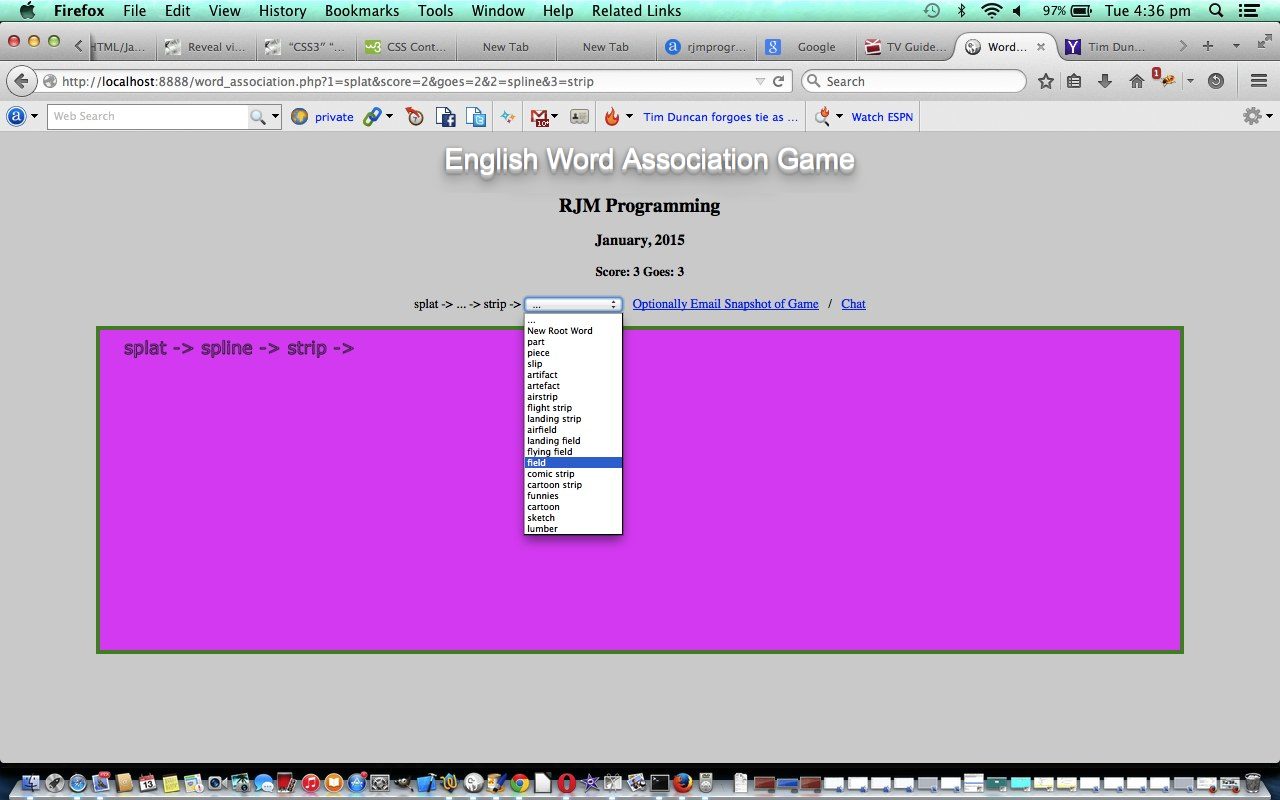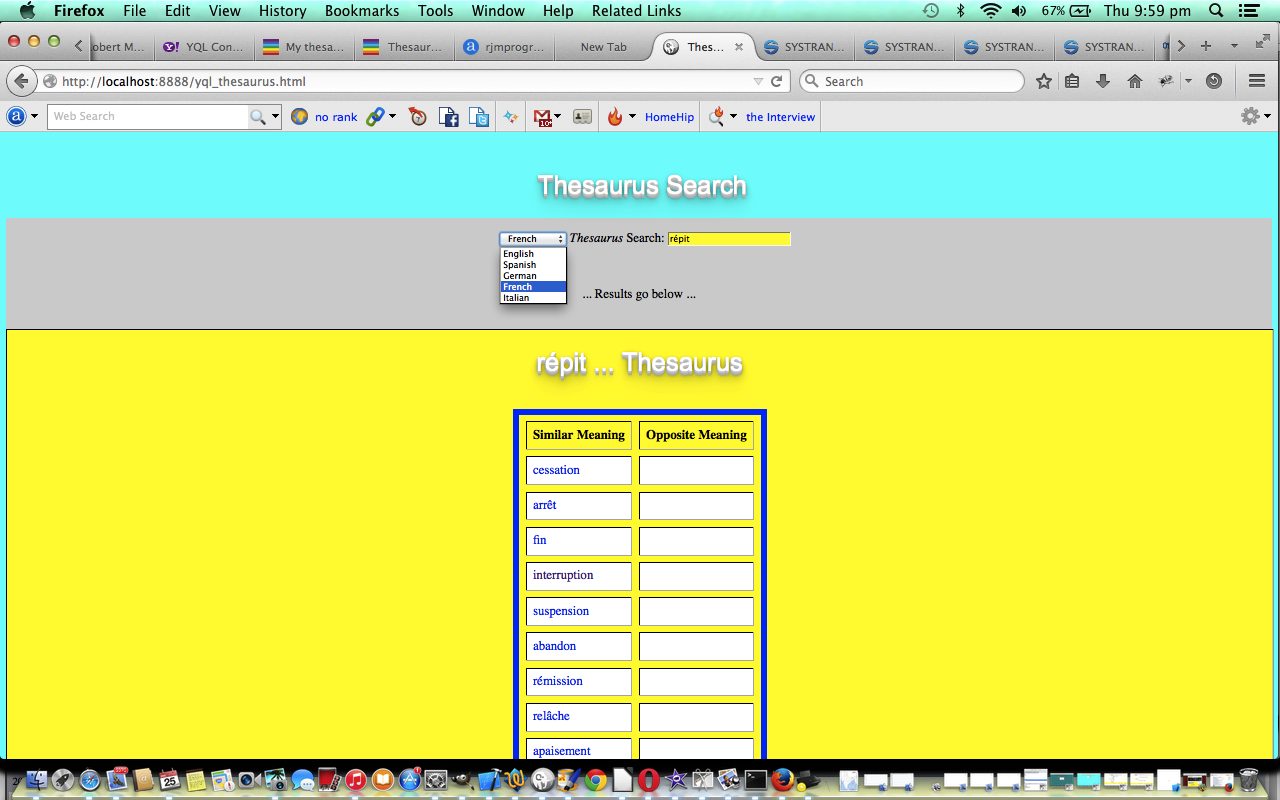Yesterday we created English Word Association Game Primer Tutorial as shown below, to show a draft English only version of a Word Association game good for ESL purposes.
Today we build on that functionality by allowing Word Associations in French or German or Spanish or Italian (the other languages offered with altervista thesaurus web service database with Yahoo YQL), in addition, as long as the user supplies the first “seed” word for these languages. Everything about the English functionality stays as is … keeping backward compatibility, as you’d see by clicking the picture of the tutorial below, where you play the English (only) Word Association Game, as we had it yesterday.
With yesterday’s yesterday’s Yahoo YQL Web Service JSON Thesaurus Tutorial, using Yahoo Web Services called YQL, as shown below, building on previous ones here at this blog, we effectively signed off on the final (supplementing recent PHP/CSS Sentence Auxiliary Verb Game Tutorial showing CSS #[elementID]:before { content: [prefixContent]; } and #[elementID]:after { content: [suffixContent]; } functionality presented on the day before yesterday) impediment to writing an English Word Association game a teacher of ESL could use for the teaching of vocabulary for an advanced student learning English as their second language (or maybe their first?!). The YQL name is the way it is because it simplified the API aspects of its functionality for the developer to concentrate on SQL, and I’m really supportive of this concept. You don’t have to output in JSON, as other data forms like XML are acceptable. Let’s see what Wikipedia says about YQL below.
Yahoo! Query Language (YQL) is an SQL-like query language created by Yahoo! as part of their Developer Network. YQL is designed to retrieve and manipulate data from APIs through a single Web interface, thus allowing mashups that enable developers to create their own applications.[1]
Initially launched in October 2008 with access to Yahoo APIs,[2] February 2009 saw the addition of open data tables from third parties such as Google Reader, the Guardian, and The New York Times.[3] Some of these APIs still require an API key to access them. On April 29th of 2009, Yahoo introduced the capability to execute the tables of data built through YQL using JavaScript run on the company’s servers for free.[3]
So this tutorial builds on the logic of the thesaurus tutorial of yesterday to use a YQL web service into data emanating from its links to the altervista thesaurus web service database with Yahoo YQL website … thanks. For the altervista thesaurus database usage it is best to request a key for your web service queries. You fill in a word (or two, or three) of interest to search for like-minded words.
And what is a thesaurus? Recap on yesterday, perhaps, by reading what Wikipedia says here but, basically, it can be thought of as a repository of a language’s list of words of a similar meaning to the word of your interest. It is a great tool for people learning a language foreign to them, especially regarding their vocabulary.
With word association, as you might imagine, a thesaurus comes in handy for the words associated with the original word and its chosen followers, but if we want a feature to be, in English execution runs, that we can supply that first English word programmatically, we need functionality like for PHP/Javascript Words Within Words Game Tutorial to get that initial English “seed” word chosen from a dictionary. For the French or German or Spanish or Italian parts of the functionality the user supplies this first “seed” word, and then the thesaurus kicks in in a programmatical way from then on, as for the English functionality.
Here is a link to some downloadable PHP programming source code which you may want to rename to word_association.php (and then there is a PHP live run).
How we got there … word_association.php
Previous relevant English Word Association Game Primer Tutorial is shown below.
With yesterday’s Yahoo YQL Web Service JSON Thesaurus Tutorial, using Yahoo Web Services called YQL, as shown below, building on previous ones here at this blog, we effectively signed off on the final (supplementing recent PHP/CSS Sentence Auxiliary Verb Game Tutorial showing CSS #[elementID]:before { content: [prefixContent]; } and #[elementID]:after { content: [suffixContent]; } functionality presented on the day before yesterday) impediment to writing an English Word Association game a teacher of ESL could use for the teaching of vocabulary for an advanced student learning English as their second language (or maybe their first?!). The YQL name is the way it is because it simplified the API aspects of its functionality for the developer to concentrate on SQL, and I’m really supportive of this concept. You don’t have to output in JSON, as other data forms like XML are acceptable. Let’s see what Wikipedia says about YQL below.
Yahoo! Query Language (YQL) is an SQL-like query language created by Yahoo! as part of their Developer Network. YQL is designed to retrieve and manipulate data from APIs through a single Web interface, thus allowing mashups that enable developers to create their own applications.[1]
Initially launched in October 2008 with access to Yahoo APIs,[2] February 2009 saw the addition of open data tables from third parties such as Google Reader, the Guardian, and The New York Times.[3] Some of these APIs still require an API key to access them. On April 29th of 2009, Yahoo introduced the capability to execute the tables of data built through YQL using JavaScript run on the company’s servers for free.[3]
So this tutorial builds on the logic of the thesaurus tutorial of yesterday to use a YQL web service into data emanating from its links to the altervista thesaurus web service database with Yahoo YQL website … thanks. For the altervista thesaurus database usage it is best to request a key for your web service queries. You fill in a word (or two, or three) of interest to search for like-minded words.
And what is a thesaurus? Recap on yesterday, perhaps, by reading what Wikipedia says here but, basically, it can be thought of as a repository of a language’s list of words of a similar meaning to the word of your interest. It is a great tool for people learning a language foreign to them, especially regarding their vocabulary.
With word association, as you might imagine, a thesaurus comes in handy for the words associated with the original word and its chosen followers, but we need functionality like for PHP/Javascript Words Within Words Game Tutorial to get that initial “seed” word chosen from a dictionary.
Here is a link to some downloadable PHP programming source code which you may want to rename to word_association.php (and then there is a PHP live run).
Did you know?
Again we use PHP and we hope this is not frustrating those readers who have no PHP installed? It is easy to install PHP web server language (and Apache web server with MySql database) locally for Windows or Mac and would recommend, respectively, EasyPHP Windows Framework for PHP/MySql Tutorial and MAMP Mac Framework for PHP/MySql Tutorial for (install) advice here.
Previous relevant Yahoo YQL Web Service JSON Thesaurus Tutorial is shown below.
Here is a tutorial that might be re-introducing you to the Yahoo Web Services called YQL, building on previous ones here at this blog. The name is the way it is because it simplified the API aspects of its functionality for the developer to concentrate on SQL, and I’m really supportive of this concept. You don’t have to output in JSON, as other data forms like XML are acceptable. Let’s see what Wikipedia says about YQL below.
Yahoo! Query Language (YQL) is an SQL-like query language created by Yahoo! as part of their Developer Network. YQL is designed to retrieve and manipulate data from APIs through a single Web interface, thus allowing mashups that enable developers to create their own applications.[1]
Initially launched in October 2008 with access to Yahoo APIs,[2] February 2009 saw the addition of open data tables from third parties such as Google Reader, the Guardian, and The New York Times.[3] Some of these APIs still require an API key to access them. On April 29th of 2009, Yahoo introduced the capability to execute the tables of data built through YQL using JavaScript run on the company’s servers for free.[3]
So this tutorial uses a YQL web service into the data emanating from its links to the altervista thesaurus web service database with Yahoo YQL website … thanks. For the altervista thesaurus database usage it is best to request a key for your web service queries. You fill in a word (or two, or three) of interest to search for like-minded words.
And what is a thesaurus? Read what Wikipedia says here but, basically, it can be thought of as a repository of a language’s list of words of a similar meaning to the word of your interest. It is a great tool for people learning a language foreign to them, especially regarding their vocabulary.
The two big PHP functions of use (as distinct from an Ajax approach, requiring no PHP … read on) for this are:
- file_get_contents
- json_decode … when there is a data structure of any complexity, this function is highly recommended, but for today’s tutorial we do not use it, and take the opportunity to show you a solution using Ajax that requires no PHP … link to some downloadable Ajax inspired HTML programming source code which you may want to rename to Ajax_yql_thesaurus.html which changes from the HTML supervising PHP approach as per Ajax_yql_thesaurus.html (and then there is an Ajax live run)
Good links for information regarding this tutorial (thanks) are:
- YQL Two Minute Tutorial from Yahoo
- Yahoo! Query Language from Wikipedia, as per quote above
- YQL Home Page from Yahoo
- YQL thesaurus help from Yahoo
- YQL JSON Parsing Help from YQL forum
Another tool you should have in your armoury for jobs like this is the online JSON validator here. A generic JSON approach to issues could be:
- Type the URL you were given into a web browser address bar and have a look at it
- Type the URL you were given into //jsonlint.com/ and have it validated
- Understand in your own mind what would be different about 1. to make it suitable
- Incorporate findings of 3. into massaging of data between file_get_contents and json_decode
Here is a link to some downloadable HTML programming source code which you may want to rename to yql_thesaurus.html which calls some downloadable PHP programming source code which you may want to rename to yql_thesaurus.php (and then there is a PHP live run).
We thank the following free online dictionaries …
Stay tuned for an interesting blog posting tomorrow which combines the new thesaurus functionality of today’s contribution, along with the functionality “smarts” of yesterday’s PHP/CSS Sentence Auxiliary Verb Game Tutorial.
If this was interesting you may be interested in this too.
If this was interesting you may be interested in this too.
If this was interesting you may be interested in this too.






You completed some good points there. I did a search on the topic and found nearly all people will have the same opinion with your blog.
Keep up the superb piece of work, I read few content on this internet site and I believe that your website is very interesting and holds circles of wonderful info .
Treasure the posting you offered.. Isn’t it great any time you locate an excellent submit? Certainly advantageous viewpoint, thanks for expression.. Is not it terrific whenever you obtain a very good publish?
Treasure the admission you delivered.. of course, study is having to pay off. My personal internet surfing seem complete.. thank you. Love the entry you offered..
I love reading through a post that will make men and women think.
Also, many thanks for allowing me to comment!
No worries, thanks.
Thank you for another fantastic post. Where else could anybody get that type of info in such an ideal means of writing? I’ve a presentation next week, and I am on the look for such information.
hi!,I really like your writing so much! proportion we communicate more about your article on AOL? I need a specialist in this house to unravel my problem. May be that’s you! Taking a look ahead to look you.
Awsome blog! I am loving it!! Will come back again. I am bookmarking your feeds also
Definitely, what a fantastic website and instructive posts, I definitely will bookmark your website.Have an awsome day!
Great blog right here! Additionally your website lots up fast! What host are you using? Can I am getting your affiliate hyperlink on your host? I wish my web site loaded up as quickly as yours lol
Fascinating column , I’m going to spend a lot more time reading about this topic
of course like your web-site but you have to test the spelling on several of your posts. A number of them are rife with spelling problems and I to find it very troublesome to inform the truth then again I will certainly come again again.
Thanks a lot for sharing this with all of us you actually realize what you are talking about! Bookmarked. Please also discuss with my web site =). We can have a hyperlink exchange contract among us!
I would like to show thanks to this writer just for bailing me out of this situation. Just after looking through the search engines and obtaining recommendations which are not beneficial, I thought my life was gone. Being alive without the approaches to the issues you’ve resolved all through your article is a critical case, and the kind which could have badly affected my entire career if I hadn’t discovered your website. Your own understanding and kindness in touching all areas was useful. I don’t know what I would have done if I had not encountered such a subject like this. I’m able to at this point look ahead to my future. Thanks for your time so much for this reliable and result oriented help. I won’t be reluctant to endorse your web site to anyone who ought to have tips about this subject matter.
F*ckin’ tremendous issues here. I’m very glad to look your post. Thank you a lot and i am looking ahead to contact you. Will you kindly drop me a e-mail?
So content to get located this article.. Treasure the entry you given.. I value you showing your perspective.. Respect the admission you given..
thank you very much